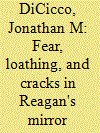| Srl | Item |
| 1 |
ID:
106270


|
|
|
|
|
| Publication |
2011.
|
| Summary/Abstract |
Investigation into an often-overlooked Cold War episode reveals a tipping point in the Reagan administration's approach to the Soviet Union. In November 1983, NATO military exercise "Able Archer 83" reportedly touched off a crisis atmosphere among Soviet officials who feared a surprise nuclear attack. Intelligence reports about the war scare startled US President Ronald Reagan, altering his understanding of Soviet threat perceptions and prompting him to embrace his moderate advisers' recommendations that the administration take a more conciliatory approach toward the country Reagan had earlier labeled the "evil empire." By highlighting Soviet fears of the United States, intelligence stemming from Able Archer 83 cracked Reagan's mirror images and catalyzed a policy shift from hostile confrontation toward cautious cooperation. The case study identifies facilitating conditions for the shift and yields counterintuitive insights relating to international crises, perception and misperception, and the domestic politics of rivalry.
|
|
|
|
|
|
|
|
|
|
|
|
|
|
|
|
| 2 |
ID:
108722


|
|
|
|
|
| Publication |
2011.
|
| Summary/Abstract |
The study of the Cold War has undergone a significant transformation in recent years, with new critical perspectives, sources and debates. The nuclear history of the Cold War has begun to yield new insights on fundamental questions about the stability and dynamics of the confrontation. Recent evidence about the events of 1983 provides an opportunity to explore the risk of nuclear war and the role of misperception in Soviet-American relations during the 'Second Cold War'. Central to this is the study of intelligence. This article examines episodes in the autumn of 1983, notably the Able Archer 'crisis' of November 1983. Attention focuses on aspects of Soviet, American and British intelligence. Political and diplomatic consequences are also considered. A principal aim is to emphasize that we are at an early stage in researching and understanding events, and that a number of assumptions about the crisis require further exploration. Broader lessons about the role of intelligence in the Cold War are nevertheless explored and provisional conclusions reached about the performances of intelligence agencies and communities.
|
|
|
|
|
|
|
|
|
|
|
|
|
|
|
|